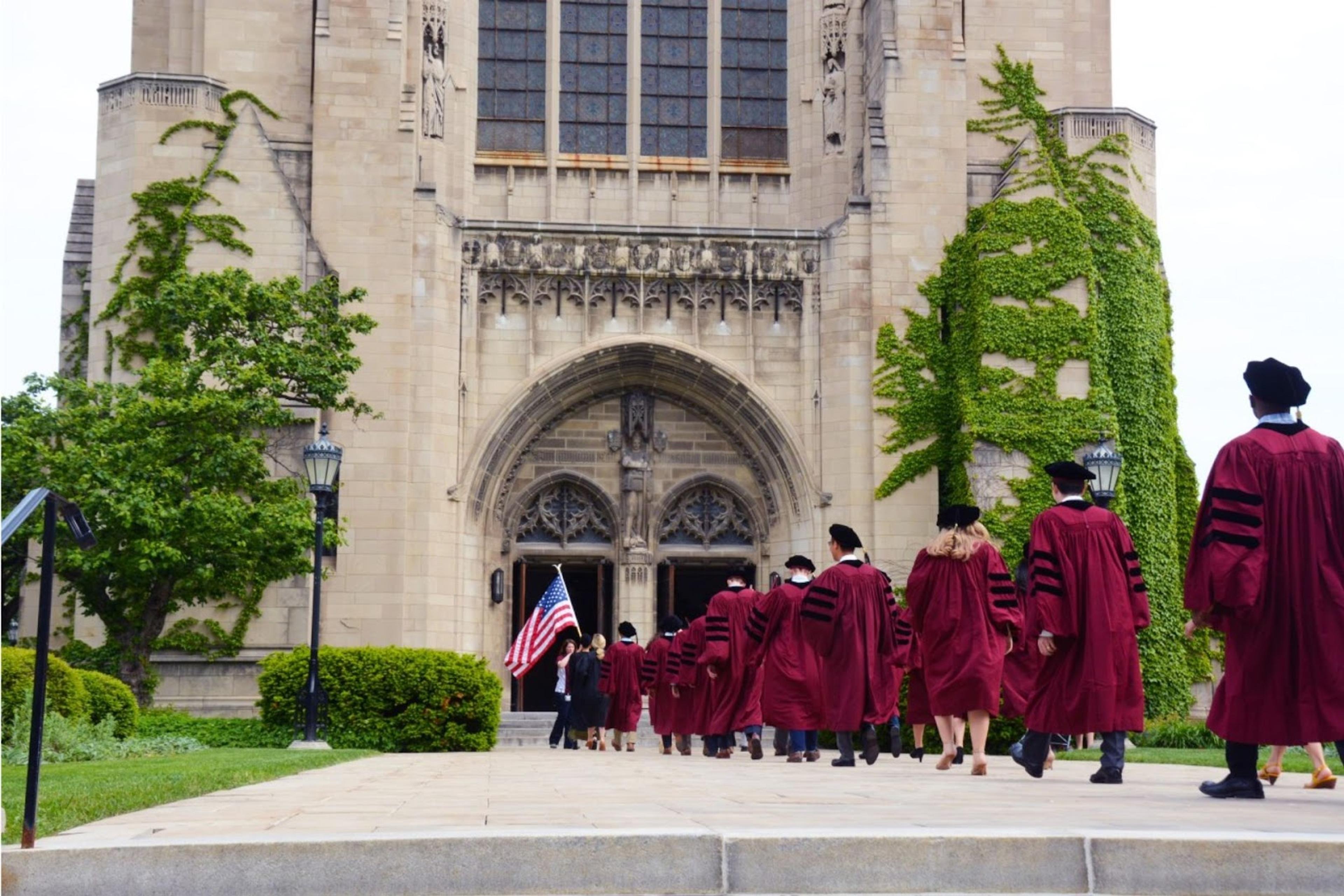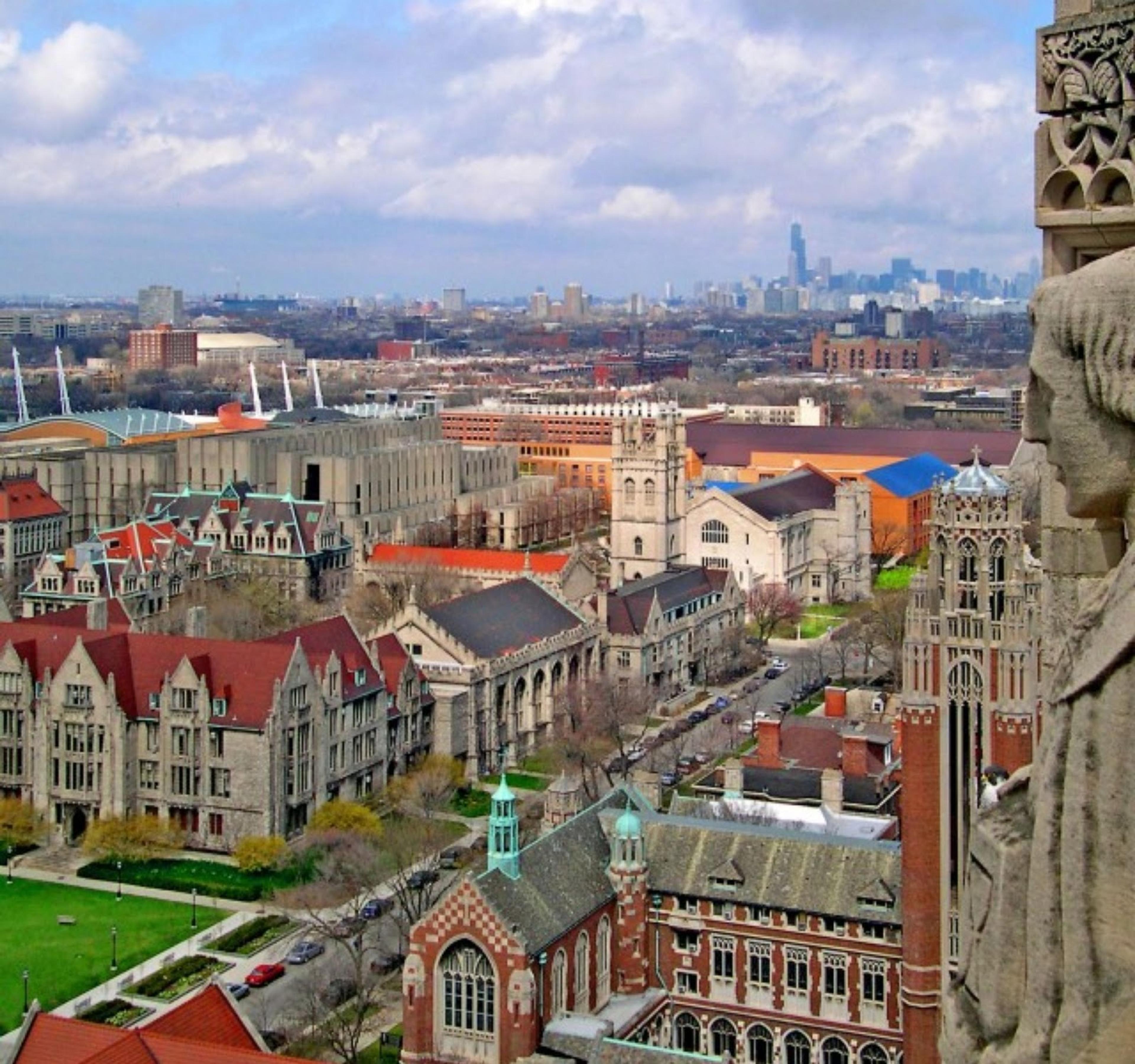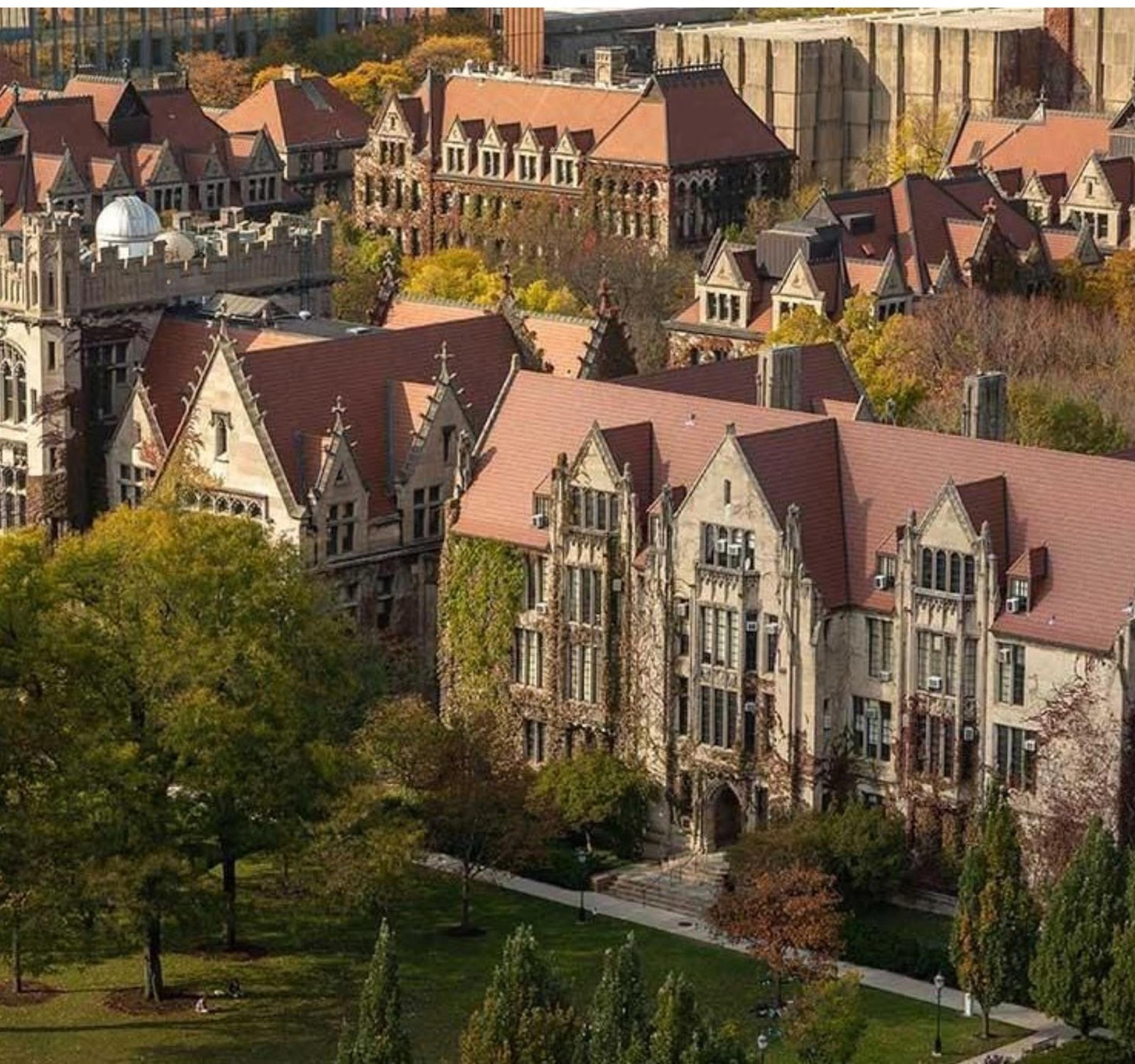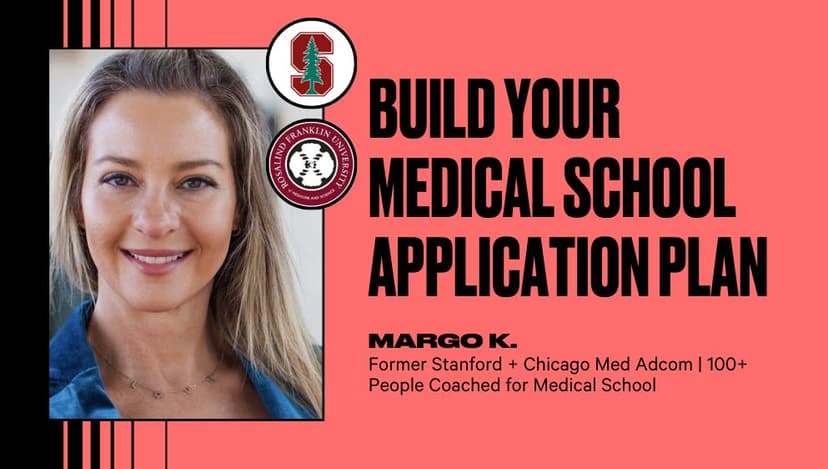How to Get Into the Pritzker School of Medicine at the University of Chicago Medical School (2026)
Learn how to get into the prestigious Pritzker School of Medicine at the University of Chicago Medical School in this guide.
Posted January 6, 2026

Join a free event
Learn from top coaches and industry experts in live, interactive sessions you can join for free.
Table of Contents
How Hard is It to Get Into Pritzker School of Medicine?
The Pritzker School of Medicine at the University of Chicago remains one of the most selective medical schools in the country. For the most recent admissions cycle, Pritzker received over 7,700 applications and admitted approximately 1.2% of applicants, placing it among the most competitive MD programs in the U.S. The average GPA for admitted students is 3.94, and the average MCAT score is 521, placing them firmly in the top percentile of applicants nationwide.
The school consistently ranks 17th among the top medical schools in the world, according to U.S. News & World Report, recognized for its commitment to underserved communities, physician-scientist training, and a collaborative academic environment. The school also values meaningful pre-medical experience: 84% of students take at least one gap year before matriculation, often pursuing research, teaching, public health, or service-based work.
Admitted students typically present GPA ranges between 3.4 and 4.0 and science GPAs from 3.2 to 4.0, reflecting both academic excellence and intellectual curiosity. If you're aiming for Pritzker, plan to submit a standout application with competitive stats and experiences that align with the school’s mission of leadership, equity, and scholarly inquiry.

Programs Offered by Pritzker Medical School
uChicago Medicine offers a variety of programs to cater to students' diverse career goals in medicine. These programs include:
- MD Program - In this traditional four-year MD program, MD students participate in rigorous medical education, clinical training, and opportunities for scholarly research and community engagement.
- Medical Scientist Training Program (MSTP) - An NIH-funded program that combines the MD with a PhD in the biological sciences division. This program is ideal for students interested in becoming physician-scientists who integrate medical science with cutting-edge research. Students receive full tuition support and a stipend during their training.
- Growth, Development, and Disabilities Training Program (GDDTP) - This program allows current Pritzker students to pursue a PhD in biomedical research after starting med school. It is geared toward those with a passion for understanding and addressing developmental disorders.
- Medicine, the Social Sciences, and Humanities (MeSH) - A unique dual-degree program offering an MD alongside a PhD in disciplines such as social sciences, public policy, anthropology, or philosophy. This program is perfect for students interested in the intersection of medicine with the social sciences and humanities, preparing them for leadership roles in academia, public health, and policy.
- MD/MBA - Offered in partnership with the Booth School of Business, this dual-degree program integrates medical school education with business leadership training. Graduates are equipped to lead healthcare organizations, innovate in medical entrepreneurship, or influence health policy.
- MD/MA in Public Policy - A joint program with the Harris School of Public Policy that allows students to earn a Master of Arts in Public Policy alongside their MD. This program is ideal for future physicians who wish to engage in healthcare policy, administration, and advocacy.
- MD/MPH - This dual-degree program focuses on public health, combining medical training with population health studies. Students gain skills in epidemiology, biostatistics, and community health, preparing them to address global and local public health challenges.
- MD/MS in Biomedical Informatics - A specialized program integrating medical education with bioinformatics. Students learn to analyze complex biomedical data and develop technological solutions to improve clinical medicine, diagnostics, and patient outcomes.
- MS in Biomedical Sciences (BMS) - A one-year master’s program designed to provide foundational training in biomedicine. This program is ideal for students preparing for medical school applications, research careers, or further graduate studies in health-related fields.
Admissions Requirements — Who Gets Into Pritzker School of Medicine?
Pritzker School of Medicine Admissions Stats: MCAT, GPA & Class Profile
The Chicago Pritzker School of Medicine seeks talented and diverse students. The incoming medical school class typically reflects outstanding academic performance and a commitment to leadership, research, and service.
The most recent class profile includes:
- Class size: 81 MD students + 10 MD/PhD students (total 91)
- Out‑of‑state students: 86% (no preference exists due to Pritzker’s private status)
- International students: ~1%
- Gap‑year rate: 84% of students took at least one year off before matriculation
- Women: ~50% (approximate parity; consistent with broader reporting)
- Students of Color (URM): ~40% (not officially published but generally aligned with competitive private med school demographics)
- STEM Majors: ~15–16% (varied majors like biology, engineering, economics, etc.; “STEM” definition may vary)
| Average | 25th Percentile | 50th Percentile (Median) | 75th Percentile | Range | |
|---|---|---|---|---|---|
| GPA | 3.91 | 3.3 | 3.91 | 4.0 | 3.3–4.0 |
| MCAT (Total) | 521 | 505 | 521 | 527 | 505–527 |
| MCAT - Biological and Biochemical Foundations of Living Systems | Data not publicly available | ||||
| MCAT - Chemical and Physical Foundations of Biological Systems | Data not publicly available | ||||
| MCAT - Critical Analysis and Reasoning Skills | Data not publicly available | ||||
| MCAT - Psychological, Social, and Biological Foundations of Behavior | Data not publicly available |
Note: Specific percentile scores for individual MCAT sections are not publicly available. For the most accurate and up-to-date information, please refer to the Pritzker School of Medicine's official admissions page.
What MCAT Score Do You Need for Pritzker School of Medicine?
To be competitive at Pritzker, a high MCAT score is essential. The median MCAT score for admitted students is 521, which places them in the 98th–99th percentile nationally. While Pritzker evaluates applications holistically, the MCAT remains a critical component.
Applicants are generally encouraged to aim for a 515+ to stay within range, with the most competitive applicants scoring 518–522. The official range for admitted students spans from 505 to 527, but most fall near the top end of that scale.
Bonus: How to Get Into Pritzker School of Medicine With a Low MCAT
- Highlight exceptional experiences in research, leadership, or service.
- Use your personal statement and secondary essays to explain any academic challenges and showcase growth.
- Obtain strong letters of recommendation that emphasize your strengths beyond academics.
What GPA Do You Need for Pritzker School of Medicine?
Pritzker’s admissions committee seeks evidence of academic excellence and intellectual curiosity. The average GPA for admitted students is 3.94, with most successful applicants earning above 3.85. While a GPA below 3.7 is possible, it’s considered less competitive unless offset by exceptional experiences, upward academic trends, or unique contributions to research, leadership, or service.
Applicants with science GPAs between 3.2 and 4.0 have been admitted, but success at the lower end of that range typically requires standout qualifications in other areas.
Bonus: How to Get Into Pritzker School of Medicine With a Low GPA
- Tip 1: Demonstrate improvement in your GPA over time.
- Tip 2: Enroll in post-baccalaureate or graduate courses to prove academic ability.
- Tip 3: Focus on strengthening other areas of your application, such as clinical experience or research.
How to Apply to the Chicago Pritzker School of Medicine
Pritzker School of Medicine Application Deadlines (2026)
- AMCAS Primary Application Deadline: November 15, 2026 (11:59 pm ET)
- Supplemental (Secondary) Application Deadline: December 1, 2026
- Letters of Recommendation Deadline: December 1, 2026
- Interview Season: Begins August 2026 and runs through February 2027, with MD interviews typically held on Mondays, Tuesdays, and Thursdays (MD/PhD interviews on preferred Tuesdays/Wednesdays).
- Rolling Admission Notifications: Start as early as October 15, 2026, and continue until the class is filled.
- Plan to Enroll Deadline (AMCAS Tool): April 30, 2027
- Commit to Enroll Deadline: April 30, 2027 (Note: This reflects updated AAMC policies; schools now use April 30 as the final "Commit to Enroll" deadline.)
Pritzker School of Medicine — Application Overview
To apply, you will need:
- AMCAS Application: Submit through the AAMC portal.
- Secondary Application: Includes essays tailored to Pritzker’s mission and values.
- Letters of Recommendation: A minimum of three letters from professors, mentors, or supervisors.
- MCAT Scores: Taken within the last three years.
- Transcripts: Official academic records from all post-secondary institutions attended.
Letters of Recommendation
Pritzker values letters of recommendation that provide a comprehensive picture of your academic abilities, character, and readiness for medical school. Applicants must submit a minimum of three letters of recommendation, but up to six letters are accepted. These letters should be written by individuals who know you well and can speak to your strengths and achievements. Ideal letter writers include professors—both science and non-science—who can evaluate your academic performance, research mentors who can describe your contributions to scientific inquiry, and clinical supervisors or volunteer coordinators who can highlight your commitment to patient care and community service. Employers or other professionals familiar with your leadership, work ethic, and interpersonal skills are also strong choices. If your undergraduate institution offers a pre-med advising committee letter, Pritzker strongly encourages you to submit it, as it can serve as a substitute for multiple letters.
To ensure strong and impactful recommendations, request letters from individuals who can provide specific examples of your achievements, growth, and personal qualities. Share your resume, personal statement, and insights about Pritzker’s mission to help your recommenders tailor their letters to align with the school’s values.
Secondaries
The Pritzker secondary application allows you to showcase your unique qualities and demonstrate how they align with the school’s mission. The essays typically focus on three core themes: diversity, leadership, and service. In the diversity essay, you should share how your background, perspective, or experiences will contribute to Pritzker’s vibrant and inclusive community. For the leadership-focused essay, discuss specific instances where you took initiative, demonstrated problem-solving abilities, or made a meaningful impact through your actions. When addressing the theme of service, highlight your commitment to serving others, whether through volunteer work, clinical experiences, or initiatives aimed at improving healthcare equity.
To stand out, write essays that are specific, concise, and authentic. Use concrete examples from your personal and professional experiences to demonstrate your values, motivations, and goals. Thoughtful and genuine responses will help you connect your journey to Pritzker’s mission.
Interviews
Pritzker conducts traditional interviews as part of its admissions process, providing an opportunity for the school to assess your fit as a future physician. Applicants are typically invited to participate in two one-on-one interviews, which are conducted by faculty members, admissions staff, or current medical students. These interviews focus on several key areas, including your motivation for pursuing medicine, your understanding of healthcare challenges, and your vision of your role as a physician. Additionally, interviewers will assess your problem-solving abilities, communication skills, and overall professionalism.
To prepare, anticipate common medical school interview questions and practice articulating your motivations for medicine and personal values. Be ready to discuss your experiences, challenges, and aspirations in depth. Think about how your goals align with Pritzker’s mission and reflect on what unique qualities you can contribute to the school’s community. Thoughtful preparation will help you deliver confident, genuine, and compelling responses during your interviews.
Watch: How to Nail Your Medical School Interview

Pritzker School of Medicine MD Eligibility
To be eligible for admission to the Pritzker School of Medicine, applicants must meet several key criteria. First, all applicants must hold a bachelor’s degree from an accredited institution. In addition, applicants must have completed the required pre-medical coursework to ensure they possess a strong academic foundation in the sciences. A valid MCAT score, taken within the past three years, is also required and serves as a critical component of the admissions review process.
Pritzker employs a holistic review process, meaning that the admissions committee considers a range of factors beyond GPA and MCAT scores. These factors include academic performance, personal attributes, diverse clinical environment experience, research involvement, leadership roles, and demonstrated service to others. This comprehensive evaluation ensures that admitted students are not only academically prepared but also bring diverse experiences, perspectives, and skills to Pritzker’s learning environment.
Pritzker School of Medicine Prerequisites
Pritzker requires completion of the following courses:
- Biology: 2 semesters with lab
- Chemistry: General, Organic, and Biochemistry (minimum 4 semesters total)
- Physics: 2 semesters
- English: 2 semesters
- Statistics or Calculus: 1 semester
5 Expert Tips on How to Get Into the Pritzker School of Medicine
- Aim for a high GPA and strong MCAT score – Academic excellence is a cornerstone of Pritzker’s admissions process. To remain competitive, aim for a GPA close to 3.9 or higher, particularly in your science courses. Consistency and upward trends in grades are crucial if your academic journey starts with challenges. Similarly, a strong MCAT score in the range of 519-521 (the school’s median) will demonstrate your mastery of core scientific concepts. If you fall short in either area, focus on improving through post-baccalaureate programs, graduate-level courses, or retaking the MCAT after targeted preparation.
- Pursue research opportunities – As a research-intensive institution, Pritzker values applicants who have hands-on research experience. Engage in scientific research during your undergraduate years, summer programs, or gap years to demonstrate your curiosity and analytical skills. Whether it’s clinical, basic science, or social science research, highlight the depth of your involvement, any challenges you tackled, and your contributions to the project. Publishing research findings, presenting at conferences, or winning awards can further set you apart as a candidate who aligns with Pritzker’s focus on innovation.
- Gain clinical experience, and show your dedication to patient care – Pritzker looks for applicants who have a deep understanding of what it means to care for patients. Gain clinical experience through shadowing physicians, volunteering in hospitals or clinics, scribing, or working as an EMT or medical assistant. Direct patient interactions allow you to develop critical skills like communication, empathy, and problem-solving. Use these experiences to reflect on the challenges and rewards of patient care, and share these insights in your application to demonstrate your commitment to medicine.
- Focus on service and leadership and make a meaningful impact – Pritzker has a strong focus on service and leadership, and applicants are encouraged to demonstrate their impact on communities. Engage in meaningful volunteer work that highlights your dedication to helping others, especially in underserved or underrepresented populations. Examples include leading community health initiatives, mentoring students, or working with nonprofit organizations. Leadership roles, such as heading a student group, starting a service project, or organizing outreach programs, showing the ability to take initiative, inspiring diverse students, and creating positive change.
- Showcase your story and fit with Pritzker – Your personal statement and secondary essays are opportunities to differentiate yourself and connect your journey to Pritzker’s mission. Write thoughtfully and authentically, sharing your motivations for pursuing modern medicine, significant life experiences, and the qualities that make you a strong candidate. Use specific examples to illustrate your resilience, growth, and alignment with Pritzker’s values of academic excellence, leadership, service, and innovation. Tailor your responses to show how you will contribute to the Pritzker community and thrive in its collaborative and research-oriented environment.
The Bottom Line
- Acceptance Rate: ~1.2%
- Average GPA: 3.94
- Average MCAT: 521
- Programs Offered: MD, MD/PhD, MD/MBA, MD/MPH
- Prerequisites: Biology, General & Organic Chemistry, Physics, English, and Math/Statistics (no strict course list, but a strong science foundation is expected)
- Key to Success: Excel academically, pursue meaningful research and clinical experiences, take at least one gap year (like 84% of students do), and demonstrate leadership, service, and alignment with Pritzker’s mission in health equity and inquiry.
With its rigorous academics and commitment to holistic care, the Pritzker School of Medicine is an excellent choice for aspiring physicians ready to excel in their medical careers.
Get the support you need to stand out and succeed in your journey to the Pritzker School of Medicine with expert, personalized coaching from top medical school coaches. More so, check out medical school bootcamps and free events for more helpful insights!
See: The 10 Highest-Rated Med School Coaches
Read these next:
- How Many Medical Schools Should I Apply to? A Strategic Approach
- How to Get Clinical Hours for Med School: Building Your Experience
- Average MCAT Scores of the Top 50 Medical Schools
- The Ultimate Guide to the Medical School Application
- AACOMAS Application Timeline: Key Dates and Tips
- Nursing School Cost – How Much is Nursing School?
- How to Become a Physician Assistant
FAQs
Can I get into Pritzker with a low GPA or MCAT?
- Yes, but you’ll need to make the rest of your application shine. Strong research, clinical work, leadership, and a compelling personal story can balance lower stats. An addendum explaining your performance can also help.
Does Pritzker prefer students who take gap years?
- Yes, about 84% of students take at least one year off between college and med school. Clinical work, research, or service during that time can strengthen your application.
What programs does Pritzker School of Medicine offer?
- Pritzker offers MD, MD/PhD, MD/MBA, MD/MPH, MD/MA in Public Policy, and more. It also has unique programs like MeSH (medicine + humanities/social science) and Biomedical Informatics.
What are Pritzker’s medical school prerequisites?
- You’ll need coursework in biology, chemistry (general + organic + biochem), physics, English, and one semester of calculus or stats.
Does Pritzker require the CASPer or other situational judgment tests?
- No, Pritzker does not currently require the CASPer test. But it does emphasize holistic review and personal qualities like leadership and service.

























